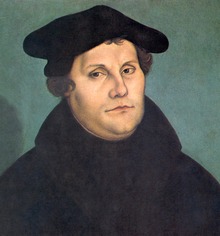 |
| Martin Luther |
“Here I felt that I was altogether born again and had
entered paradise itself through open gates.” That is how Martin Luther described
his conversion.
What does “born again” mean? The phrase occurs in 1 Peter
1:23 and twice in John 3 (where it may also be translated, “born from above”).
John 3 describes a conversation between Jesus and a religious teacher named
Nicodemus. Nicodemus objects that a man cannot enter into his mother’s womb and
be born a second time, so Jesus clarifies “born again” as “born of the Spirit.”
In subsequent verses, we read that Nicodemus does not
“understand these things”; he does not “accept” Christ’s testimony; and he does
not “believe.” If he believes, he will have eternal life (John 3:16), but at
the time of the interview, he does not. Since he has not been born again, these
things make no sense to him.
Several conclusions flow from Jesus’ interview with
Nicodemus.
First, the new birth is something God does. In the natural realm,
we do not produce our own birth. Likewise, those who have been born into God’s
family “were born, not of blood nor of the will of the flesh, nor of the will
of man, but of God” (John 1:13).
Second, when Jesus said, “You must be born again,” He was not
giving Nicodemus a command. He was telling him what his problem was. The reason
he didn’t believe was that he had never been born again.
Third, the new birth must precede believing in Christ. You
do not receive the new birth after you believe. To the contrary, you cannot
believe until God works the miracle of the new birth in your heart. Then you
necessarily believe.
This raises a problem in the minds of many people: Why does
God command us to believe in Christ if we cannot believe until He changes our
hearts in the miracle of the new birth? What use was it to tell Nicodemus that
he was not born again if there was nothing Nicodemus could do to produce the
new birth? The answer lies in the possible responses Nicodemus might have had
to Jesus’ words.
For example, Nicodemus might have become angry at Jesus:
“Jesus, why do you bother to tell me what’s wrong with me if you are not going
to tell me how to change! That is either cruel or stupid. I think you must be
off your rocker! I’m outta here!”
On the other hand, Nicodemus might have gone away with a
heavy burden of guilt and sorrow. He might have said, “I am sure that Jesus was
sent by God, so He must be giving it to me straight. My situation is hopeless.
If God does not intervene, I will never believe and be saved. Woe is me!”
This second response is often the first step in God’s
producing a repentant, believing heart. “For thus says the high and exalted One
who lives forever, whose name is Holy, I dwell on a high and holy place, and
also with the contrite and lowly of spirit In order to revive the spirit of the
lowly and to revive the heart of the contrite” (Isaiah 57:15).
A man must know he is sick before he will submit to a
treatment that will change his whole life. A sinner must know he is helpless before
he is low enough to receive the help that will reorient all his attitudes and
priorities.
Apparently, Jesus’ stern message to Nicodemus had the effect
of lowering his pride and bringing him to faith because in the dark hour after
the crucifixion he came bringing spices for Jesus’ burial. If you do not yet
trust in Christ, you cannot make yourself believe. Maybe you need to echo the
prayer of a distressed man who said to Jesus, “I do believe; help my unbelief”
(Mark 9:24).
[I first published this in the Allentown Morning Call a few weeks ago.]
[I first published this in the Allentown Morning Call a few weeks ago.]
No comments:
Post a Comment